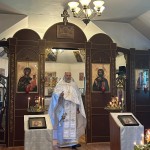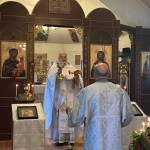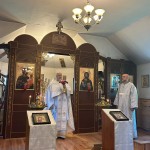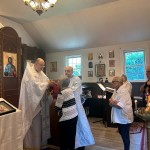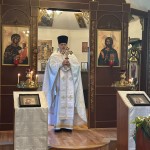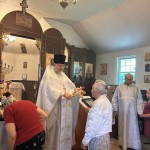On August 20, on the 11th Sunday after Pentecost, Rector of St. George Church, Archpriest Igor Tarasov headed the Divine Liturgy in our parish temple. After the reading from the Holy Gospel he preached the following homily:
“Dear brothers and sisters in Christ! Today is the 11th Sunday after Pentecost and today’s Gospel is dealing with certain material things; it is about lending money and paying them back. And today’s Epistle lesson is also discussing material matters. St. Paul writes about his concerns regarding the material support of those who preach the Gospel. He is telling the Christians in Corinth that the Apostles have a right to be paid for their ministry. He says, “If we have sown spiritual things for you, is it a great thing if we reap your material things” (1 Cor. 9, 11). The main idea of the Apostle here is very clear: preachers of the Gospel, either Apostles or their successors, the clergy, must be given material support to be free to sow spiritual things”.
“St. Paul articulates his thoughts further by explaining that it is understandable and acceptable that people who are doing certain jobs are entitled to the fruits of it. “Who ever goes to war at his own expense? Who plants a vineyard and does not eat of its fruit? Or who tends a flock and does not drink of the milk of the flock?” (1 Cor. 9, 7). Thus, today we may reflect on those thoughts of the Apostle and reassure ourselves that it is not “a plea of man’s invention” but a rule of life: we must take care of the needs of the Church and her servants”.
“To understand better why St. Paul wrote about that, we have to recall the circumstances surrounding his preaching in the city of Corinth. We mentioned before that Corinth was a large and wealthy city in Greece, very famous for its culture and wealth. But “to live a Corinthian way” meant to live a wealthy but immoral life. At that point, preaching of St. Paul and other Apostles made many Corinthians Christians. But most of the newly converted to the Christian faith were poor citizens or even slaves. It was very difficult for them to support the Apostles. That was the reason why St. Paul had to labor working with his own hands and was not asking for the support from the Corinthians. However, he realized that in the future, when Christianity will be more and more accepted by the population of the city, many rich individuals will join the community. Then the Apostles or their successors will have a right to ask for material support. Then they would be able to concentrate on the spiritual activity, and their temporal needs will be taken care by the community. This is why St. Paul is instructing the faithful in Corinth that those who serve near the altar have right to eat from the offerings brought to the altar. This was the Old Testament rule mandated by God. The same rule applies to the preachers of the Gospel and the New Testament priesthood. St. Paul is telling that the present situation when the Apostles work for self-support is not normal. It is only a result of temporary difficulties, and it must be changed when the difficulties will be overcome”.
“All of us are members of the Church. And the Church is a mystical Body of Christ. Through Baptism everyone is called to be a member of that Body. And as members we must take care of the Body, to maintain it and to support its functions. This is the way we deal with our own bodies: we eat, we drink, we warm them up, we watch them to be safe, we try to heal them if they are sick. Now we have to realize that the Church needs the same kind of care. In another Epistle St. Paul writes, “For no one ever hated his own flesh, but nourishes and cherishes it, just as the Lord does the Church. For we are members of His Body, of His flesh and of His bones” (Eph. 5, 29-30). Thus, if we usually do not hate our flesh but take care of it, why should not we take care of the Church to which we belong? And taking care of the Church means to support the Church servants and their ministry. It means to contribute temporal goods to support clergy”.
“If all Christians always understood these ideas of St. Paul we would avoid many problems, conflicts and misunderstandings that have been taking place in the Church history and still exist in today’s Church. St. Paul reveals that such problems started to appear in the Church from the very beginning. Even among the early Christians were certain people who questioned the right of the Apostles to be supported by their communities. Therefore St. Paul was forced to utter, “Do we have no right to eat or drink?” (1 Cor. 9, 4). He had to explain that the Apostles have the same need as everybody else: to eat and to drink. Even common sense of justice or fairness requires to pay those who work for you. If someone does something for us, we should be grateful and maybe compensate them. We pay all kinds of persons performing work or service for us. “If others are partakers of this right over you, are we not even more?” asks St. Paul. Who deserves more than your own body. And as we said, the Church is our spiritual body. And who deserves more? The one who provides temporary things, or the one who sows among you spiritual things, eternal things? Is it too much if he reaps your material things in return?”
“This is the message of today’s Epistle lesson. While it does not contain very profound spiritual ideas, it does give us a solid spiritual understanding how to handle our everyday Church affairs. It tells us what attitude should we all have towards managing of the temporal goods of the Church. That can help us in our Church life, so we may easier find a way of our salvation”.
During the Litany of Fervent Supplication the Rector had a petition for the suffering country of Ukraine and its people. He also added a commemoration of the “suffering Ukrainian land” at the Great Entrance.
During preparation for Holy Communion the choir director nicely performed hymns of the Transfiguration and hymns dedicated to Venerable Martyr Dometius whose memory was celebrated on that day.
After the dismissal of the Liturgy the Rector made some announcements and asked the parishioners to help cleaning the church and its premises to prepare for the greatest Theotokian feast, Holy Dormition.

